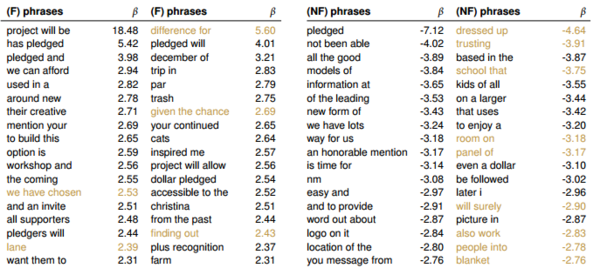Choosing the Right Words to Lure Financial Backers
Startups and other businesses across the education space are used to having to fight, claw, beg, and borrow to raise the capital needed to build and sustain their operations, especially in the early stages.
A recent study examines a popular platform to help entrepreneurs round up money—the crowdfunding vehicle Kickstarter—and suggests that aspiring business owners would be wise to follow one bit of advice in particular: Choose your words carefully.
The study, conducted by researchers at the Georgia Institute of Technology, in Atlanta, finds that the language used by aspiring entrepreneurs through the crowdfunding tool “plays a major role in driving the project’s success.”
The study authors, Tanushree Mitra and Eric Gilbert, closely studied 20,000 phrases, filtered from a much larger pool of nine million phrases, controlling for variables such as the goals for the fundraising project, its duration, and whether a video presentation is attached to it. The researchers worked from a list of URLs for projects that sought money through Kickstarter, and they restricted their dataset to projects that had reached their last day for collecting money.
Their study was initially released at the Computer-Supported Cooperative Work and Social Computing Conference earlier this year. I first saw a reference to it in an entry on the Software & Information Industry Association’s blog.
So what were the key words and phrases linked with success in fundraising through Kickstarter? Language that paid off tended to emphasize the following:
- Reciprocity. Phrases that signaled lucrative offers to potential financial supporters, such as language that agreed to mention a funder’s project, were predictors of successful funding. (Perhaps not surprisingly, phrases that conveyed negative attitudes or doubt—”I have not been able” to finish the project, or those that mention that they “hope to get” something—didn’t do as well.)
- Scarcity or exclusivity. Fund-seekers who said potential backers would be granted access to a product that was rare or limited in supply did well. Language that said investors would be “given the chance” to become part of a special project helped lure capital.
- Social identity. Successful Kickstarter entrepreneurs often conveyed the idea to potential funders that they were part of a social group that was being made “accessible” to others, or that they were helping build a project from the ground up.
- Authority. Many entrpreneurs who secured money conveyed their expertise to project creators and developers. Projects that used language declaring that the creators would accomplish one thing or another tended to fare well.
Confidence, it seems, pays off. “People often resort to expert opinions for making efficient and quick decisions,” the researchers noted.
The Kickstarter study did not break out entrepreneurs seeking funding for education projects, specifically, as opposed to those looking for money for businesses in other fields, Mitra explained in an interview.
Since the study was released earlier this year, Mitra said she’s heard from a lot of company officials hoping to get her advice on how they might wordsmith their business ideas in ways that will bring in more money. She’s had to turn them away, explaining that her focus is on academic research, not consulting.
But entrepreneurs focused on education and other areas who are trying to make sense of the results would be wise to avoid dwelling on specific words or phrases identified in the study, and focus instead on the broader content of those words within the message they’re trying to get across, Mitra noted. “It’s more about how you frame it, than it is the exact phrase,” she said.
That said, here’s a list of specific words and phrases for projects that drew the most funding (labeled “F”) and those that did the worst (“NF”):
Not all the words and phrases associated with positive results on Kickstarter, strictly speaking, made much sense from a business standpoint.
One of the winning phrases was “Christina,” which the researchers speculate may be linked to the popularity of celebrities like Christina Aguilera. It also seems that entrepreneurs would be wise to mention cats. Yes, cats.
“We had no clear explanation for the occurrence of cats,” the researchers write, “except for the commonly acccepted wisdom that the Internet loves them.”

